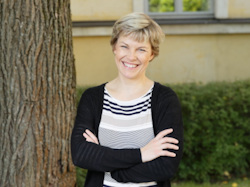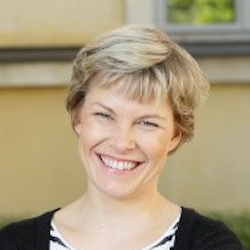What is your research background, Anna-Leena? And what led you to becoming Chair of the Una Europa Diversity Council?
In a broad sense, my research looks at inequalities: inclusion and exclusion in societal institutions. I’m interested in how the processes of othering – exclusion, discrimination, racism, etc. – work in different contexts. More concretely, my research looks at inequality at different levels of education, from primary level to higher education, as well as social service contexts – migrants encountering the welfare state, for example.
I have actively been involved in diversity, equity and inclusion work in different universities I’ve been working at, collaborating with faculties on how we can develop our institutional practices and procedures to better take into account the diversity of students, faculty members and administrators in our community. I also been working in the Helsinki Inequality Research Initiative, a consortium that brings researchers together from diverse disciplinary backgrounds to look at inequality issues beyond disciplinary silos.
All this together has led me towards the Una Europa Diversity Council, to where I am now. I think the Council is a great opportunity for universities to work to work together on issues of inequality at the European level, within the framework of the European Universities Initiative.
Tell us about the mission of the Una Europa Diversity Council.
Our primary mission is to see diversity mainstreamed within the Una Europa alliance. When we talk about diversity, it doesn't happen in a social vacuum – it’s always related to the context we’re in. We have to think about how our objectives, vision, mission and activities actually link to the existing social, historical, economic and political context in our universities and in our societies.
As leading universities in Europe, we have an opportunity to bring together excellence in education and diversity. But I think it also requires us to look at our historical background in Europe – the fact that we are operating on the grounding created in imperial nation states in many cases, and the history of modernity and colonialism that builds in global and local inequalities. Looking back at history is a necessary part of the process of articulating where we are now and where we would like to go in the future.
There are two insights into diversity that the Council has highlighted. One is to understand that we must always talk about diversity in terms of multiple differences. No one is not just one thing, or have just one identity. It's always a lot of different things that put us in different positions in society and in the educational system, depending on what the context is.
The other is a structural understanding of inequality – the procedures, practices, ideals and normativities that might be excusive. In order to understand why inequality is happening, we need to see how structures leave people out or don't allow them to become what they could become in our education system, in our community.
We hope to translate the vast amount of literature and research done in the area of diversity at Una Europa universities and beyond into practice. We want to give people in Una Europa who are delivering alliance activities the tools to understand what diversity means in practice – the kinds of ideas and actions we should pay attention to make our universities and our alliance more inclusive.
" When we talk about diversity, it doesn't happen in a social vacuum – it’s always related to the context we’re in. We have to think about how our objectives, vision, mission and activities actually link to the existing social, historical, economic and political context in our universities. "
Anna-Leena Riitaoja
Chair, Una Europa Diversity Council
Senior Lecturer in Education, Helsingin yliopisto/Helsingfors universitet
Last year, the Diversity Council published the report, Engaging with diversity in European universities. What did it aim to do?
The publication brings together various perspectives – on how diversity and inclusion is developing in different areas: data collection, research, education, and sharing good practices. For example, there was a lot of work was done on data collection practices and principles. What I found interesting is that we see the same kind of processes in very different ways at different universities. And also, how collecting data can make some inequalities visible but hides other inequalities.
There’s a big emphasis in the report on the idea of the community. How to develop the community – students, faculty and staff – and what kind of best practices have been developed in the area of diversity and inclusion – ideas we could think about mainstreaming throughout the alliance. It also looks at student voices as part of this process so that they become not just as the object of things but are also considered part of the community who can contribute and share their ideas in building our community.
The main focus of the report is Una Europa universities obviously, but there are a lot of literature, practices and ideas gathered from elsewhere, too. I think the publication is also valuable beyond Una Europa and could be used as a tool in discussing how together we can make the European higher education sector more inclusive and more diverse.
One thing the publication highlights is while there is a desire to support diversity within the alliance, we still have a long way to go in terms of mainstreaming diversity as part of Una Europa. That’s why I think it’s great it’s part of our alliance objectives at the moment. [Diversity and inclusion is one of six Transversal Themes Una Europa has brought to the fore as guiding principles for our collaboration, along with student and staff mobility; integration of education and research; international dimension; and sustainability and climate protection.]
The Diversity Council is gathering in person at Universidad Complutense de Madrid this week. What’s the purpose of this meeting?
During this meeting, we are going to begin to develop a vision and action plan for the diversity and inclusion Transversal Theme, which we will deliver to the General Assembly in Leiden at the beginning of June.
This is a new Diversity Council. There are members who have been involved under Una Europa’s pilot project, but also many new members too – we have three new universities who have joined Una Europa, for example. So, as we start to collaborate on our vision and action plan, we want to come together and get to know each other in person as a basis for our collaboration. Our meeting in Madrid will give us a chance to explore what our dream for diversity in Una Europa is, how we are going to get there, and what kind of things are needed to realise this vision.
The first day of our meeting falls on International Women's Day. That's a great symbolic thing.




